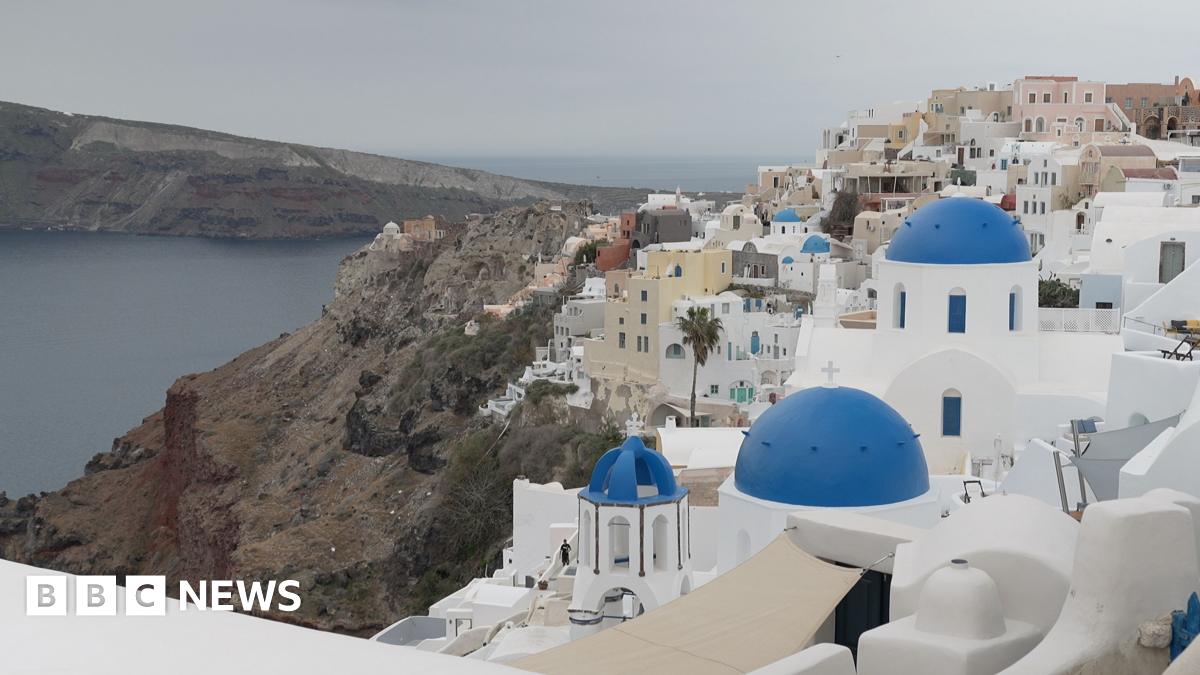Santorini Volcano: Investigating The Next Eruption

Welcome to your ultimate source for breaking news, trending updates, and in-depth stories from around the world. Whether it's politics, technology, entertainment, sports, or lifestyle, we bring you real-time updates that keep you informed and ahead of the curve.
Our team works tirelessly to ensure you never miss a moment. From the latest developments in global events to the most talked-about topics on social media, our news platform is designed to deliver accurate and timely information, all in one place.
Stay in the know and join thousands of readers who trust us for reliable, up-to-date content. Explore our expertly curated articles and dive deeper into the stories that matter to you. Visit Best Website now and be part of the conversation. Don't miss out on the headlines that shape our world!
Table of Contents
Santorini Volcano: Investigating the Next Eruption
Santorini, the iconic Greek island famed for its breathtaking sunsets and whitewashed villages, holds a more dramatic secret beneath its picturesque surface: a restless volcano. While its last major eruption devastated the Minoan civilization centuries ago, the question on many scientists' minds is not if the Santorini volcano will erupt again, but when. This article delves into the latest research and monitoring efforts aimed at understanding and predicting the next eruption.
A History of Volcanic Fury:
The Santorini caldera, a vast underwater crater, is a testament to the island's violent past. The Minoan eruption, around 1600 BC, ranks among history's most powerful, causing a tsunami and dramatically altering the landscape. This catastrophic event provides crucial insight into the volcano's potential for future eruptions, albeit with significant uncertainties. Subsequent eruptions, though smaller, have occurred throughout history, demonstrating the volcano's ongoing activity. Understanding these past events is vital in predicting future behaviour.
Modern Monitoring Techniques:
Scientists employ sophisticated techniques to monitor Santorini's volcanic activity. These include:
- GPS measurements: These track subtle ground deformation, indicating magma movement beneath the surface. Even minuscule changes can be significant indicators of pressure build-up.
- Seismic monitoring: Networks of seismometers detect earthquakes, a common precursor to volcanic eruptions. The frequency and intensity of these tremors offer crucial clues about the volcano's state.
- Gas emission analysis: Monitoring the release of gases like sulfur dioxide provides insights into the magma's composition and the pressure within the volcanic system. Changes in gas composition can signify impending activity.
- Thermal imaging: Satellite and ground-based thermal imaging identifies heat anomalies, indicating areas of increased volcanic activity.
Predicting the Unpredictable:
Despite these advanced monitoring tools, predicting volcanic eruptions with pinpoint accuracy remains a challenge. The complexities of volcanic systems make it difficult to establish definitive eruption timelines. However, improved monitoring and data analysis are enhancing our ability to identify potential precursors and issue timely warnings. Researchers are continuously refining their models, incorporating historical data, geological surveys, and real-time monitoring information to improve prediction capabilities.
The Importance of Preparedness:
While predicting the precise timing of an eruption is difficult, understanding the potential risks is crucial. Civil protection authorities in Greece are actively involved in developing evacuation plans and public awareness campaigns. These preparations are essential to minimize potential damage and casualties should an eruption occur. This proactive approach highlights the importance of ongoing research and collaboration between scientists and government agencies.
Looking Ahead:
The Santorini volcano remains a subject of intense scientific scrutiny. Ongoing research, incorporating advanced technologies and improved data analysis, is crucial for refining our understanding of volcanic processes and improving our ability to predict future eruptions. The work being undertaken is not just about scientific advancement; it's about protecting lives and preserving the unique beauty of this remarkable island. Further research into the volcano's complex dynamics will continue to be essential for mitigating future risks and ensuring the safety of the island's inhabitants and visitors. This ongoing effort underscores the global importance of volcanology and its role in safeguarding communities situated near active volcanoes worldwide.
Call to Action: Stay informed about the latest developments by following reputable scientific sources and official government advisories regarding Santorini volcano activity.

Thank you for visiting our website, your trusted source for the latest updates and in-depth coverage on Santorini Volcano: Investigating The Next Eruption. We're committed to keeping you informed with timely and accurate information to meet your curiosity and needs.
If you have any questions, suggestions, or feedback, we'd love to hear from you. Your insights are valuable to us and help us improve to serve you better. Feel free to reach out through our contact page.
Don't forget to bookmark our website and check back regularly for the latest headlines and trending topics. See you next time, and thank you for being part of our growing community!
Featured Posts
-
 Police Algorithm Predicted Medium Risk For Lina Before Her Murder
Apr 22, 2025
Police Algorithm Predicted Medium Risk For Lina Before Her Murder
Apr 22, 2025 -
 Elon Musk The Space X Innovation Revolution
Apr 22, 2025
Elon Musk The Space X Innovation Revolution
Apr 22, 2025 -
 Mens Health Uncovering Why Men Avoid Gp Visits
Apr 22, 2025
Mens Health Uncovering Why Men Avoid Gp Visits
Apr 22, 2025 -
 Investigation Launched Into Vandalism Of Statues At London Transgender Protest
Apr 22, 2025
Investigation Launched Into Vandalism Of Statues At London Transgender Protest
Apr 22, 2025 -
 Gatwick Airports Persistent Flight Delay Problem
Apr 22, 2025
Gatwick Airports Persistent Flight Delay Problem
Apr 22, 2025
